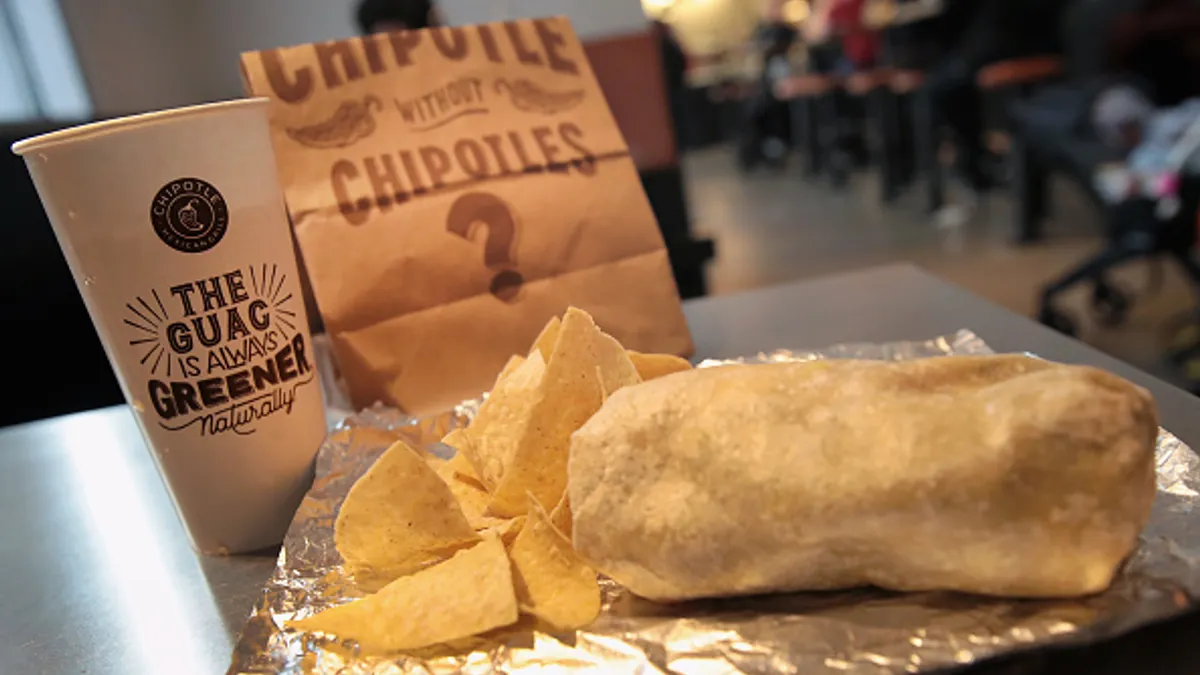Dive Brief:
- A shareholder says fast casual food company Chipotle Mexican Grill acted fraudulently by claiming earlier this year it had made no change in its policy on portion sizes even while customers were complaining they would sometimes get meals smaller than had previously been typical, according to a lawsuit.
- “Chipotle’s portion sizes were inconsistent and left many customers dissatisfied,” alleges plaintiff Michael Stradford in his Nov. 11 complaint in a California federal court.
- In a critical analysis of the case, Kevin LaCroix, an attorney who specializes in directors and officers liability issues, called the case an example of everything that’s wrong with securities litigation today. “Looked at from the perspective of what the securities laws are for … there is a good case that could be made that this lawsuit trivializes the entire system,” LaCroix said in his blog. “Can there really be a valid claim for securities fraud … based on the plaintiff’s allegations that ‘Chipotle’s portion sizes were inconsistent and left many customers dissatisfied with the company’s offerings?’”
Dive Insight:
The complaint accuses the Newport Beach, Calif., company and its CEO at the time, Brian Niccol, and CFO John Hartung of misleading investors by insisting the company hadn’t changed its policy while acknowledging customers were receiving smaller portions in some cases.
“The company’s securities had been artificially and falsely inflated by defendants’ misleading statements,” the complaint says.
The issue became a public affairs headache for the company after customers complained about shrinking portions on social media and mainstream media outlets like the Washington Post amplified them.
To address the matter, Niccol said during the company’s second-quarter earnings call that management was asking its 3,500 restaurants to be consistent in portion size and, to help ensure that, was planning for higher ingredient costs.
“I want to take a minute to address the portion concerns that have been brought up in social media,” Niccol said. “There was never a directive to provide less to our customers. Generous portion is a core brand equity of Chipotle. It always has been, and it always will be.”
Niccol, the CEO of Starbucks today, said costs for ingredients in the upcoming quarter were expected to be higher by “40 to 60 basis points” in what he said was an investment so that “outlier restaurants” that haven’t been providing the proper-sized portions would do so.
“The feedback caused us to relook at our execution across our entire system with the intention to always serve our guests delicious, fresh, custom burritos, and [bowls] with generous portions,” he said.
This and other communications about the matter led to decreases in the company’s share prices, resulting in investor losses, the lawsuit claims.
“The precipitous decline in the market value of the company’s common shares [has led to] significant losses and damages” to shareholders, the complaint says.
The share price dropped about 4%, to about $50 a share, after the second-quarter call and then by another 8% after the company’s third-quarter call, in which the higher costs that had been predicted earlier were said to be happening, according to the complaint.
In his analysis, LaCroix said proving the company and its two top executives were trying to be deceptive will be difficult.
“The court will look long and hard to find anything that even arguably satisfies the scienter pleading requirements, much less the requirements to plead falsity,” he said.
“The U.S. system has a uniform reputation abroad as being overly litigious, involving unproductive litigation that imposes unnecessary costs on the markets and the markets’ participants,” he added. “When the commentators in other countries are talking about these kinds of problems in the U.S. system, they are thinking about lawsuits like this one.”
In an email to Legal Dive, Chipotle’s chief corporate affairs officer, Laurie Schalow, declined to comment other than to say the company would “vigorously defend our industry leading real food.”











